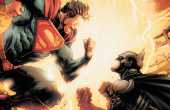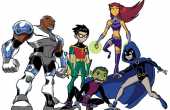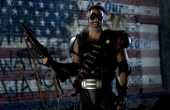Aaron Hatch
I'm majoring in Graphic Design at Fitchburg State University. My favorite topics to talk about are movies, animation and comics.
Correspondent I
- Plebian Penman
- Common Writer
- Aristocratic Author
- Lurker
- Pssst
- Hand Raiser
- Vocal
- Outspoken
- Extrovert
- Sharp-Eyed Citizen
- Town Watch
- Detective Deskman
- Penman Patrol
- Actor
- Producer
- Article of the Month
- ?
- Articles
15 - Featured
9 - Comments
329
- Ext. Comments
154 - Processed
68 - Revisions
61
- Topics
33 - Topics Taken
3 - Notes
82
- Topics Proc.
89 - Topics Rev.
7
- Points
4093 - Rank
22 - Score
2771
Latest Articles
Latest Topics
film Write this topicAre Having Computer Generated Effects a Bad Thing?A lot of people talk about how much they dislike CGI in films, and how they want more practical effects. They want more particle sets. They want more make up effects. They want to really feel like the character and setting are real, and not made on a computer. While CGI is over used in films: does that mean that they should not be in films at all. When is it appropriate to CGI, and when is it not? Also take in to mind that making CGI is a lot of work, and takes weeks or months to get right. With that said: is making images for film on a computer screen not considered hard work, or is just fans of practical effects not giving credit, where credit is due?
|
film Write this topicWhen a Movie Studio Dislikes Their Own MovieWhen looking for news on the new Fantastic Four movie, I heard that Fox studios has an embargo for critics, meaning a movie critic cannot talk about the movie at all until the film is released. Essentially, this is a sign that Fox is worried about critics disliking the film, therefore causing bad press for Fantastic Four. Why is this? If a film studio does not like one of their own films, why make it in the first place? Why are January and February filled with crappy movies? I feel its more complicated than just simply saying "all films now-a-days sucks." Maybe a movie sounded good on paper, but turned out bad in execution. I just find it strange that movie studios would take a risk financially with releasing bad films they have no faith in.
|
film Write this topicWhy the NC-17 Rating Should Not ExistWith and an R rating, a director can get away with practically anything. Intense blood and sexual nudity can be seen in many film that are R rated. So In that case: Why does the NC-17 rating still exist? Some will say it is for movies that go to far with their sex and violence, but that is not really true. The reason the NC-17 raring exists is because basically, the film studio does not want the audience to see the film. This can be seen when films with a gay/lesbian sex scene will get an NC-17, but a movie with a man and women having descriptive sex still only gets an R rating. The film This Movie is Not Yet Rated demonstrates this problem.
|
film Write this topicCould Black Widow Have Her Own MovieEveryone loves Black Widow in the cinematic universe, not just because she is sexy and bad ass, but also because her character in more normal when compared to the other members to the Avengers. So could she handle a whole movie, sourly dedicated to her. On one hand, It would be interesting to see where the Marvel Cinematic Universe would take a spy/superhero film. On the other hand, it is not interlay necessary considering we already know so much about her already.
|
comics Write this topicThe Woman in Refrigerators Theory: Killing Females in ComicsThe term "Woman in Refrigerators" was coined by comic book author, Gail Simone. It is a trope in comics that a female character is killed or brutally injured by a villain, giving a reason for the hero to hate the villain even more. The trope can be insulting to women because of how it uses female violence as a cheep way to get emotion from a reader. What should writers do to avoid this trope? Can this be hard for writers to want to tell a compelling story, without having to kill a female characters? Does this mean you can't kill any female characters, even though male and female deaths happen all the time in comics? Is there a difference between killing a female character for story reasons, and killing a female character for a cheap gut punch.
|
animation Write this topicThe Representation of the LBGTQ Community in Children's AnimationIn inspiration from gay marriage being legalized in the United States, it would interesting to examine how animation entertainment treats the LBGTQ community, in more recent years? In particular, how has the LBGTQ community been represented in children's animation? After all, The children are our future, and we should be sending a positive message of how to treat everyone like you want to be treated. What do we have do to have more gay or transgender characters in our children's shows and films, and how do we go about it?
|
Published | film Write this topicDo We Need the Authors Approval in a Film AdaptionWhen an author hates the film adaptation of their book, it is mostly because the film missed what made the book so special. While it only makes sense for an author to want to defend his/her own book, does that make the film adaptation automatically bad? While Stephen King may be open on how he disliked The Shining, a lot of film fans would say that the movie is a masterpiece, regardless of King's disapproval. Should hate a film based on what the author says, or should just judge the film on our own?
|
film Write this topicIs It Right to be Nostalgia Blind?Whenever a remake, adaptation, or a sequel comes out, fans can't help but compare it to the original because of how good the original was. On one hand, any film should always be judged in its own way, even if it is based on another property. On the other hand, does the film itself just beg to be companied to the original, simply because it was based on other property. Does comparing it to the original help us understand the flaw of the remake/adaptation/prequel, or does it blind as a viewer to enjoy anything new in a franchise.
|
Latest Comments
| The Endings of Evangelion: Exploring Shinji Ikari | |
Yeah, That is true. In Loki’s case, He’s too good as a villain, so much so that he is more fun than Thor | The Marvel Cinematic Villains: What Makes a Memorable Antagonist? |
Red Skull not actually being dead is definitely possible. However, the reason I don’t think he will return is that Captain America: Civil War will most likely be the last Captain America movie, meaning the chances for Red Skull returning is very minimum. Who knows, we’ll just have to wait and see. | The Marvel Cinematic Villains: What Makes a Memorable Antagonist? |
Well said my friend. Thanks for Reading | The Marvel Cinematic Villains: What Makes a Memorable Antagonist? |
Thank you very much Jaye. Your kind words really mean a lot to me 🙂 | Women in Refrigerators: Killing Females in Comics |
Yeah, like I said in the article, I start to wonder if Marvel Studios are just setting themselves up for disappoint when it comes to Thanos. He definitely need to have a bigger role in future films. | The Marvel Cinematic Villains: What Makes a Memorable Antagonist? |
I actually loved Kilgrave, and I thought he was one of the best villains that came from Marvel Studios, but that’s just me. Thanks for reading. | The Marvel Cinematic Villains: What Makes a Memorable Antagonist? |
I would love to see more female Marvel villains like Enchantress | The Marvel Cinematic Villains: What Makes a Memorable Antagonist? |







I would safely say that The End of Evangelion is probably the darkest anime I’ve watched. It invokes a surreal and depressing feeling I have not felt with any other anime. I’ve always described it as if David Lynch directed and anime. As for Shinji himself, I probably would be in the camp that doesn’t like him, but I wouldn’t go far enough to say I hate him. I appreciate the series trying to explore depression and how that would effect a typical anime lead character. Thanks for the fantastic article